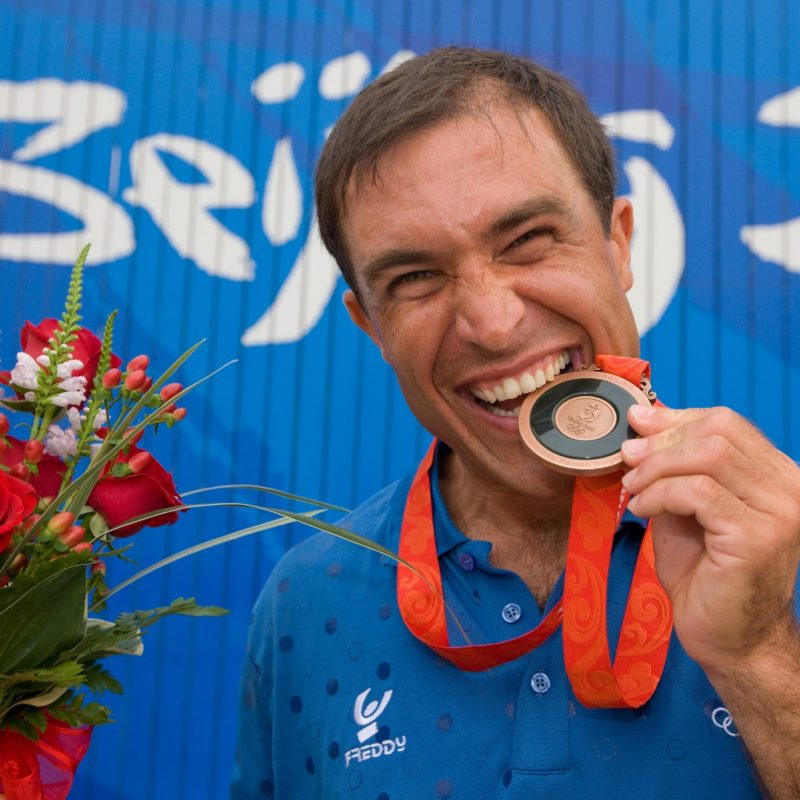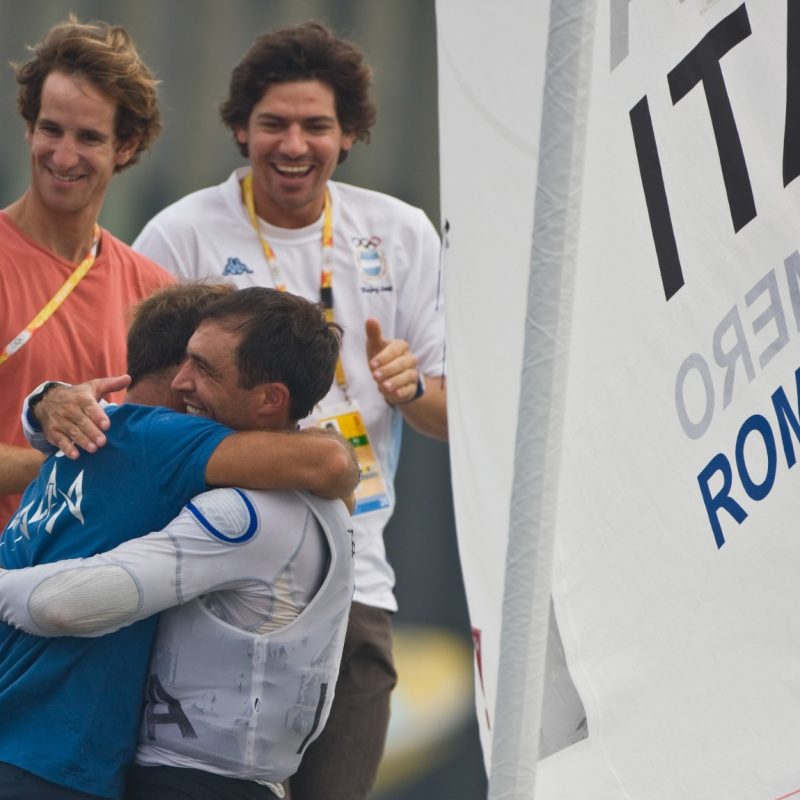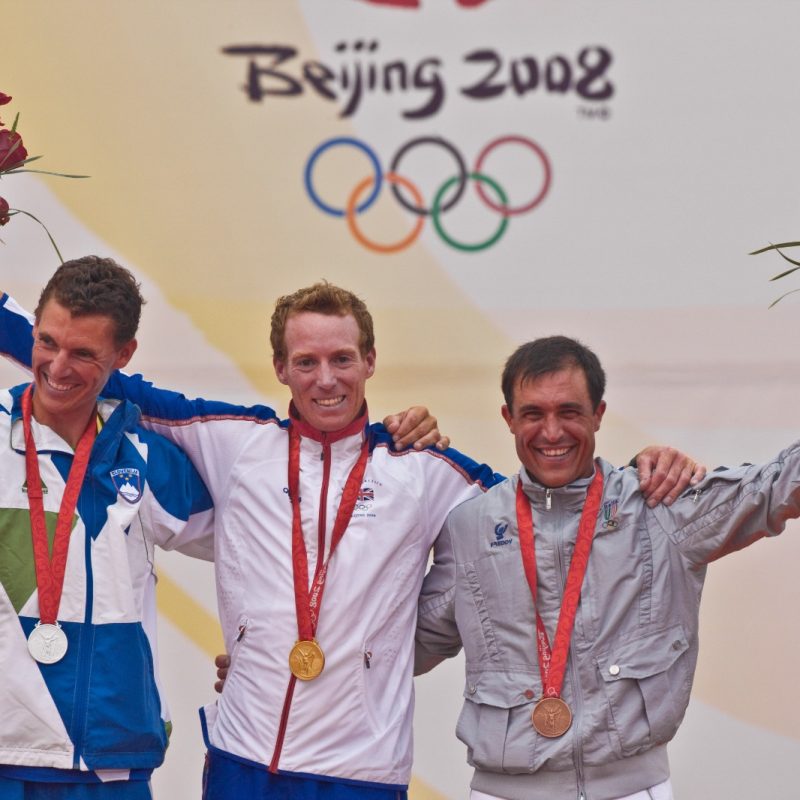Lake Garda - Lifestyle - Sport & outdoor
The story of Olympic sailing champion Diego Romero Paschetta continues here! You can find the first part of his interview on the “Sailing Training on Lake Garda” post, and the second part continues below, with his experience in Riva del Garda and the Olympics in China.
In 2007, I moved from the Argentinian national team to the Italian one. However, from 1996 to 2011 I had the same coach, and I planned the training sessions for the 2008 Olympics with him. After having been selected in May 2008, I was able to train by myself every day for the Beijing Olympics, following his instructions.
Around 7-7.15 AM I started the day with a 45-min run. After breakfast, I did some stretching, and afterwards I alternated cycling and sailing sessions.
At the end of the day, I dedicated myself to weights and stretching. Basically, I did 2/4 training sessions a day, between running, weights, stretching, and cycling.
In Laser class, athletic training is more important compared to training in the water. By that I mean physical, technical, and mental preparation.
At that time I was, out of the top athletes, the most physically prepared, although I have always been the shortest of all laserists. I was already technically trained, so I focused more on physical fitness. The main goal was to reach the ideal weight to sail fast.
The conditions I found in China were what I was expecting, because they resembled a place I knew well. Some coach friends I trusted described the Olympic field as being similar to places I already knew on the Mar del Plata.
I devoted myself to mental preparation 3 or 4 times a day, trying to concentrate on visualizing the conditions I had already found many times in Mar del Plata. Thanks to this intense training, the first impact upon arrival in Beijing was immediately positive. The first 15 days there, would allow me to adapt and fine tune – not the boat (at least not in the Laser category), but rather what I could do do to sail as fast as possible.
Right from the start I felt fast, and confident. I felt I had the right speed, the right tactic, the right technique to get good Olympic results.
Speaking with Robert Scheidt a few days ago, while we were having a coffee together, he reminded me of my experience at the Athens 2004 Olympic Games. I was flying in Athens! The first day of racing was a mess, because for days I was always training on the left side, because the wind came from the left every day. But on that day, a gust of wind from the right came all of a sudden, and I finished the race in a terrible position. Despite this bad first result, in the middle of the games I was able to recover up to third place. Later I got an OCS and went down to 18th place, and then closed the games in 12th place.
So I knew that despite having a very high racing level, you have to do everything perfectly.
In the training days leading up to the regattas, I tried to store as much information as possible. If I found the same conditions every day, I would have had about an 80% chance to find them on race day as well. However, this is not always the case, as it happened to me in Athens. Wind from the left every day, and gusts from the right on the first day of the race, taking me completely by surprise.
Instinct matters a lot. In a technical sport like sailing or even tennis, motor repetition is very important and it is an aspect that should not be underestimated during technical preparation. It is very important to assimilate gestures, actions at the subconscious level. You don’t have time to analyse so everything has be automatic.
It is therefore very important to carefully analyse the mistakes made in the water, to avoid repeating them to automate the body’s response.
I was a little nervous because it was my third Olympic Games and I knew I had a chance. However, in the other two Olympic Games, there was my coach who told me “if you do everything like this, you can certainly make it to the podium”. This time I didn’t start as badly as in Athens, but I could have done so much better. That day, before going into the water, I was fifth and I knew that silver was within my reach. Therefore, my goal that day was to do all I could to finish second or third, tops.
Before I went into the water, I analysed my rivals to see how they were doing. So while I was washing the boat I realised that the Slovenian athlete was very calm, serene. On the other hand, the Portuguese (Gustavo Lima) and the French (Jean Baptiste Bernaz) were quite nervous.
At this stage I knew that if I could control my thoughts I would definitely have an advantage over them. Luckily, my race went more or less as I wanted. Gustavo and Jean Baptiste had gone to two different extremes, and unfortunately, Rasmus was covered by the English from the start. In the end, during the race I realised that I could win the bronze medal. It was all so slow, with only a slight breeze and the game was over.
I have always liked strong wind, but for that regatta I was ready for light wind conditions. If there had been strong wind conditions, I certainly wouldn’t have had a chance because the other heavier athletes would have gone faster.
So I was very happy, the only thing is that I had to wait before celebrating until everyone finished their race, to confirm the gaps in the score that would have awarded me the medal.
Too bad I didn’t win gold! I was in the lead for 3 days, and then due to two mistakes I couldn’t win the gold medal. I felt that I could have won it, I felt good but then there were two mistakes during the whole Olympic championship.



I was incredibly happy because I trained for years, 12 years of preparation, to win an Olympic medal that finally came. I also knew how lucky I was, because there are many athletes who reach this very high level, and fail to win in the end. I was delighted! When I landed, my Italian teammates were waiting for me, but also my Argentinian teammates. Everyone congratulated me and it was a huge thrill. Then, the FIV president was also waiting for me, crying because he suffered so much with me. He suffered so much pressure because he strongly wanted me in the Italian team, receiving a lot of criticism from the Italian sailing community.
In the end, I didn’t feel pressure from others, because it was nothing compared to all the enormous sacrifices I made over the past 12 years.
For instance, in Cordoba I lived in the club for two years into a caravan, because it was 1 hour from the city and I didn’t have the budget to go back and forth to train every day. So I moved into this caravan that my parents had inside the club, and lived there for almost 2 years.
On top of that, in order to support my Olympic campaign I worked for many years as a laser radial trainer. That is how I was earning money for my campaigns. For a first level athlete, having to work instead of having time to recover is a handicap, an advantage that you give to other athletes.
Another year, in 2006, the Argentinian federation did not pay for car rental to move boats from one place to another. I found myself making an agreement with the English girl I was coaching in radial, so part of my remuneration was repaid by lending me her car with the possibility of moving my boat as well as hers. Basically, I found myself working as a driver to cover what I needed.
To be honest, the pressure of IVF was almost insignificant, compared to what I had to face over the years. For me, the desire not to make mistakes was stronger, because I knew I could do it.
I was very emotional at first, so I started practising yoga to control my body and my emotions. Before, I got ahead of myself when I was in the water, and when something was wrong, I screamed. Thanks to yoga, I was able to focus on my performance.
Thanks Diego for sharing your experience with us. You showed that the work of athletes is not just about their bodies, but also about their minds and hearts. We’ll always be here, in Riva del Garda, to welcome you like the first time, in 2005 when you joined the “big family” of Centro Vela Residence!